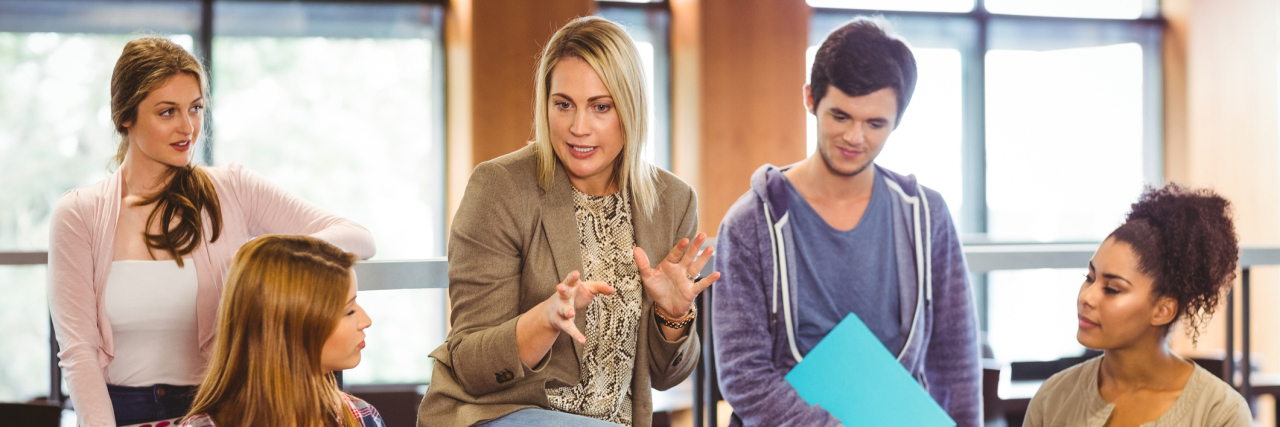I have always enjoyed having a mentor – someone, usually a teacher, who is older and wiser than me and who can guide me through the challenges of life. Therefore, when I first came to college, I immediately started going to professors’ office hours in search of someone who I could form a bond with. To my surprise, I found a myriad of professors, deans, and administrators who were more than willing to lend a helping hand and listen to my concerns. However, none of the connections I was forming felt “right” or “natural” to me.
At first, I couldn’t figure out why I felt such a divide between myself and my professors, despite their kind and compassionate gestures. That all changed when I emailed a professor who had a research interest that I wanted to explore. Little did I know a simple “can I help you in your lab?” email would develop into a relationship of understanding, encouragement, and even a bit of dog sitting.
As a blind student with other chronic health conditions, I’ve always been treated as lesser than my classmates, despite the fact that I was placed into the gifted education program in kindergarten. Teachers had no idea what I struggled with on a daily basis, which made it nearly impossible for them to provide me with suitable accommodations for my health issues and disabilities. The same was true my first semester of college, until I joined the aforementioned forensic psychology lab. When the professor first offered me a spot in the lab, I exerted so much effort in order to mask my disabilities. As I reflect upon those first couple of months in the lab, I now realize that was a mistake.
I struggled to try and be “normal.” I wanted to contribute in any and every way I possibly could, but I was ignoring my own limitations. After a long and tiresome debate with myself, I reluctantly pulled her aside and explained my health concerns. It turns out, she already expected something. Instead of being shocked and nervous about letting me continue in her research lab, she responded by asking, “What can I do to help?” This made my experience in the lab all the more enjoyable and fulfilling, and also encouraged me to seek a new career path in forensic psychology and academia. She provided me with accommodations that no one else had thought of, so I assumed that she had experience with serving students who have disabilities. I was only partly correct in this assumption.
After being offered the position of lab manager the following semester and really diving headfirst into the field of forensic psychology, I started to talk with this seemingly-quiet professor much more often. One morning during a lab meeting, she nonchalantly revealed something to me that led me to feel even more connected with her – she has trigeminal neuralgia. I also have this chronic pain condition, and I had never previously met anyone else who lived with it. At this point, I understood why she was so willing and eager to have me as a part of her lab: she understands.
She’s had the “I feel as if an animal is clawing deep into my cheek” or “someone is repetitively stabbing me and pouring burning liquid into my open wound” days, and she knows what it feels like to struggle academically due to these unique challenges. This one connection allowed me to establish a sense of trust that I’ve never had with anyone else before. Most importantly, she has illustrated to me that it is possible to obtain a career and thrive in academia while experiencing chronic pain, illness, or disability. While this may seem obvious to some, I am a doubter. I had myself convinced that there was no place for a chronically ill, visually impaired forensic psychology professor and researcher in this world, when in reality, this is the exact field in which I am needed most. This professor, who is now my academic advisor and friend, has saved me from much more than she will ever know just by simply being there to help – and by sharing a part of herself with me that we surprisingly have in common. I will be forever grateful for all the opportunities she has given me, and I will grow in my career knowing that she has shaped me into an eager, passionate psychologist.
I share my story for several reasons, with the most important being: find some – anyone – who understands you and your challenges, whether that be a professor, online friend, family member, or coworker. It makes so much more of a difference than you can ever imagine. Reach out, take the risk, ask to join the research lab…do whatever it takes. You will be so glad that you did.
Getty Image by Wavebreakmedia

